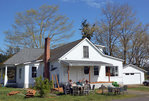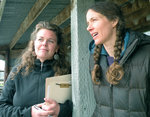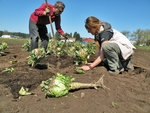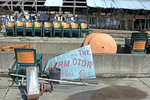Crystie Kisler and Kate Dean are sitting at a dining table in the kitchen of the historic Brown Dairy farmhouse in Chimacum, reflecting on the farm's rich past and on its hopefully sustainable …
This item is available in full to subscribers.
We have recently launched a new and improved website. To continue reading, you will need to either log into your subscriber account, or purchase a new subscription.
If you had an active account on our previous website, then you have an account here. Simply reset your password to regain access to your account.
If you did not have an account on our previous website, but are a current print subscriber, click here to set up your website account.
Otherwise, click here to view your options for subscribing.
* Having trouble? Call our circulation department at 360-385-2900, or email our support.
Please log in to continue |
|







Crystie Kisler and Kate Dean are sitting at a dining table in the kitchen of the historic Brown Dairy farmhouse in Chimacum, reflecting on the farm's rich past and on its hopefully sustainable future.
The iconic white farmhouse, built in the 1890s in the heart of Chimacum Valley, is unfurling this spring into a gathering place for 21st-century farmers in Jefferson County.
Kisler and Dean are two of more than a dozen people who have had a hand in helping it all blossom.
In the space where Gloria Brown spent a lifetime, in the kitchen where Kisler and Dean are chatting, is now the Wi-Fi-connected FarmHouse Offices and CoLab, with offices for Jefferson Land Trust, the Organic Seed Alliance and Washington State University Jefferson County Extension. An offshoot of the CoLab in downtown Port Townsend, it is a place where new and experienced farmers can gather.
Where a small herd of dairy cows once grazed, now stand thousands of organic apple and pear trees, plots of grain, and test rows of cabbage plants and onion seedlings, with more seed experiments to come.
In sheds where farm equipment was once stored, a commercial kitchen is planned, with Finnriver Farm & Cidery aiming to open a tasting facility and community hub by early 2016, with tasting events taking place potentially as early as this summer.
Eventually, Finnriver Farm & Cidery expects to move its cider production a few miles up Center Road to the old Brown Dairy site to create a new venture, Finnriver Orchard.
Jefferson County is reviewing the project's phased plan now.
OPEN HOUSE, SHARING
An open house to introduce the community to the Chimacum FARM Collaborative is set for 10 a.m., Wednesday, May 20 at the property, located at 9165 Rhody Drive. Yes, FARM is an acronym; it stands for fish, agriculture and resource management, because the goal is for all 50 acres, including the portion of Chimacum Creek that runs through it, to be tended for years to come.
The collaborative houses the FarmHouse Offices and CoLab and both private and public nonprofits.
And it is to be called Finnriver Orchard, because Finnriver Farm & Cidery now has a 30-year lease on the property and a five-year window to buy it from eight local investors, who bought it from Gloria Brown in 2011.
“This is a farm hub where we are not just aggregating processing, we're aggregating conversation. We're aggregating relationships. We're aggregating inspiration for agriculture,” Kisler says when asked to sum up what's happening on the farm.
“And on a practical level,” adds Dean, “you're sharing resources, helping spread out the infrastructure costs. Instead of all these separate entities operating far and wide, they are saying there's some efficiency to be gained working together, not just in terms of investment, but it terms of a working relationship.”
NOT LONG AGO
A few decades ago, Dean and Kisler, both 44, were newcomers to the county and to farming, passing by the Brown Dairy on their way to their own fledgling enterprises.
Today, Dean and Kisler represent the next generation of farmer in Chimacum Valley – but in different ways.
When Dean came to Old Tarboo Farm in 1999, she remembers that longtime local farmer Brad Brown would lend her his manure spreader several times a year.
“I remember being in the milking parlor talking to him. I was 25, and he thought I was crazy,” says Dean, who moved on from spreading manure to buying Finnriver Farm with Keith and Crystie Kisler and Will O'Donnell, then starting Mt. Townsend Creamery with O'Donnell, and then switching to farm policy and planning.
Today, Dean, coordinator for the North Olympic Development Council, is a policy wonk. She's working on a grant with the Kislers and their partner Eric Jorgensen to start a commercial kitchen at the farm. It would be situated on a concrete slab that once was the foundation of a shelter for farm equipment. The council is a nonprofit made up of representatives from counties, cities, ports, tribes, public utility districts and economic development councils as well as Washington State University. Its goal is to manage projects to enhance the region's vitality, she says – like the one envisioned for that old dairy she used to drive by.
Then there's Kisler, a New York City girl who met a farm boy at Yosemite National Park while in college. She ended up marrying that farm boy, Keith, whose wheat-farming family had emigrated from Russian to eastern Washington more than a century ago. Kisler planned go into teaching and did that for a while. She moved on to focus her energies on Finnriver Farm & Cidery and, like Dean, has become active in the finer economics of farming and fermenting. She is on the boards of the Olympic Culinary Loop and the Washington State Wine Commission.
When the two arrived in Chimacum Valley, longtime farmers, including Brad Brown, weren't so sure about all these young folks coming in. They wondered if they would stay.
“No doubt, it was disconcerting to have people coming in,” Kisler admits. “But we share the common ground of this valley now. Agriculture has been a unifying element. Farmers share concerns,” says Kisler.
“Our neighbor farmers like at Red Dog, Shorts and Spring Rain all share knowledge and equipment. There's a sense of sticking together to make it work.”
“What inspired us to become farmers, along with Keith's family history, was reading Wendell Berry's essays on fidelity. Pick a person and a place and make a commitment,” says Kisler.
Kisler has picked Keith and the Chimacum Valley.
Others have picked Jefferson County as well, not just for its rich farm history, but for its focus on the future.
DAIRY PLANS, CREAMERY
As young farmers like Dean and Kisler were arriving in the late 1990s, many old-time farmers were starting to wind down their operations, some because those farms were no longer economically viable.
It was Sarah Spaeth, executive director of the Jefferson Land Trust, who first raised concerns about the Brown Dairy after the Browns sold their herd in 2003.
Gloria Brown then had sold one 23-acre parcel to the Jefferson Land Trust and Karyn Williams of Red Dog Farm, but there was still 50 acres of the land. Some worried the land would be sold off piecemeal.
Spaeth approached Brown and was delighted to find Brown amenable to working with the trust, which bought a conservation easement in 2009 for $150,000, which Spaeth says goes beyond purchasing development rights to ensure the property remains as farmland.
It also allowed Brown a lifetime residency in that farmhouse. She died in 2013.
“It was such a pleasure to get to know her and to learn about the Brown family legacy in Chimacum,” Spaeth recalls of Brown and her hopes for the land she lived on for half a century.
Once the development rights were purchased, the market price of the property dropped, allowing eight local investors to create Chimacum Dairy LLC, which bought the property from Brown in August 2011, explained a spokesperson.
Those investors initially leased the property to Mt. Townsend Creamery, which had considered moving its operation to the dairy heartland. Gloria Brown had hoped it would happen.
A feasibility study, funded by the U.S. Department of Agriculture through ShoreBank Enterprise Cascadia, looked at whether a dairy and cheese factory would work on the property.
“The creamery looked feasible, but the dairy did not,” Dean remembers.
Mt. Townsend Creamery co-owner Nik Lance said the creamery has an excellent relationship with the Smith Dairy in Sequim, so it didn't need to have a dairy. And preliminary plans to build a wastewater treatment facility, which would have been required, estimated it would have cost $1 million, which “completely blew the budget out of the water.”
Lance and Kisler say things changed, goals changed. By the end of 2014, when its four-year lease expired, the creamery opted not to renew the lease at the Brown Dairy.
Not long after that, the City of Port Townsend changed its codes, making a site for Mt. Townsend Creamery near the Port Townsend Business Park doable, Lance notes.
The creamery is now planning to consolidate its operations into a new, as-yet-unbuilt 16,000-square-foot facility, warehouse and retail space along Howard Street. Those expansion plans are estimated to cost between $2.5 million and $3 million. A new creamery could be up and running by the first half of 2016, according to Lance.
CREAMERY OUT, FINNRIVER IN
With the creamery out, Finnriver owners considered their options. They had already planted 1,000 organic apple trees that had been rescued from the Skagit Valley in the back section of that Brown Dairy property.
“As [the creamery] transitioned out of the plan, we became interested in ensuring the presence of the orchard,” Kisler says.
For the future, Finnriver's cider production and tasting room also are slated to be moved from the current facility on Barn Swallow Road – a narrow, one-lane gravel road – to the old Brown Dairy, which has more parking possibilities closer to a main thoroughfare.
The new Finnriver Orchard plan will take money, approximately $1.5 million–$2 million, Kisler estimates.
Kisler expects to tap into local investors, family foundations and grants along with heading to any regional banks for help.
“Local investment is really making this possible.”
PUBLIC, PARTNERSHIPS
Because the land has a conservation easement made possible through public funding like Jefferson County's Conservation Futures program, which the Land Trust used to help secure that easement, Kisler says it's important that public's investment be honored.
It's a vision that Dean says is key to the new farm economy that she and the Kislers and so many others envision.
“We're trying to get lots of different partners on the land so that it's a real community resource, so that it's a hub for education and advocacy and education,” says Kisler.
“Economic development is tricky. We need strong partners in the private sector. Crystie, Keith and Eric are willing to follow the regulations and they are also willing to think in innovative ways,” says Dean.
The Kislers and Jorgensen are like a three-legged stool, says Kisler of how involved the three are in the project to turn the farm into a working farm for so many people.
Under the roof of that historic farmhouse will be both private and public farm-oriented endeavors and the CoLab, where new and experienced farmers can meet.
The current list of partners includes the American Farmland Trust, Jefferson Land Trust, Organic Seed Alliance, North Olympic Salmon Coalition, Essentials Blooms, Power Trip Energy, Farmhouse Offices and CoLab and Washington State University Jefferson County Extension.
And there are also ties between the agencies. The public extension agency, for example, is teaming up with the private nonprofit Organic Seed Alliance to do organic seed production.
“There's a lot of positive energy in this communal space where people and work together and interact,” says Laura Lewis, WSU County Extension executive director, of sharing an office space with the seed alliance in what once was an upstairs bedroom.
“It's sort of a one-stop shop for new and beginning farmers to the county,” she adds.
“It's close to the Grange, to Cenex and it's in the heart of that hub,” Lewis says of the area, which is rapidly returning to being a center, a core, for the farming community in Jefferson County.
The farmhouse is a stone's throw from the Chimacum Corner Farmstand, which welcomes people with a sign reading “Food from Here” at the busy intersection.
FARMING PAST, FUTURE
Spaeth says that what's happening at the intersection of Chimacum's busiest corner – Rhody Drive, Center Road, Beaver Valley Road, Chimacum Road – is the kind of innovation that is drawing people from afar interested in farming to Jefferson County.
“We have an agricultural movement here that other places are inspired by,” says Spaeth, rattling off farms that have been protected through easements, WSU-sponsored programs that have lured young farmers from all over the country, and sales outlets for farmers, such as the Food Co-op and the farmers markets.
“There's a lot of appeal to the next generation of farmers coming on line because of what we have going on here. We don't have a whole lot of farms. We have more people interested in buying farmland,” Spaeth says.
As for the historic Brown farm, she says, “That's such a signature property. It's significant to our landscape. The house itself is amazing and its long history of being a dairy and the fact that Chimacum Creek runs through it. It is at the crossroads of what I think is the heart of our agricultural community.”
WSU's Lewis agrees.
“I'm thrilled that Finnriver is so excited about settling in there. I think there's so much potential.”
“In terms of numbers, we're at the bottom, with very few small farms, compared to other counties in the state, but we have successful farms. They are progressive and open-minded, and [farmers are] willing to take risks,” Lewis says, agreeing with Spaeth's conclusion that farming endeavors like the Finnriver Orchard are key to the new farming economy.
“I think that having this collaborative partnership at the corner will strengthen it even more.”
Dean notes that during the most recent economic downturn, several dozen farm jobs were added in Jefferson County.
VIABLE PLANS
Down the road a few miles, off Egg & I Road, Gerald Bishop operates the last dairy in Jefferson County. Going organic, he said not long ago, saved his farm. That, and the fact that he owned it outright.
Kisler, Dean and others say they want to keep the past in mind as they try to save farmland for the future.
“We want to be sensitive to people's sense of history on the land, but also look forward to what is possible,” Kisler says of the Brown Dairy.
Kisler and Dean sit at the table talking about details of what's going where and when – in a month, a year, longer. They're remembering why they first came to Jefferson County, wanting to be farmers.
Now, they're back working on a project that is welcoming so many farm-centered organizations and young farmers, some younger than themselves.
“We feel like this is part of preserving the American small family farm. It's giving people a chance to be on one, to see it thriving, to enjoy its beauty, to taste what's grown here,” says Kisler.
It used to be that people were born into farming, says Kisler. “Now people are being called to farming.”
“Many people have showed up to this place with a call to farm, and this community has welcomed them and asked, 'How can we help?' It's a remarkable convergence of many efforts to support local agriculture,” she notes.
Kisler can sit and stare out the window and talk as long as times allows. Her cell phone rings a lot. Lots of people are involved in this project and want to talk.
“This is going to be working land forever, so we need farm plans that are viable,” says the 21st century farmwife.
Kisler was still grappling with what to call it all as she and Dean chatted at the table – Chimacum FARM Collaborative, Finnriver Orchard. That's final – maybe.
“Folks who have known the farm for decades are going to call it the Bishop place or the Brown Dairy because that's how they first knew it. That's all right,” Kisler admits. The Bishop reference is to William Bishop, who had established a dairy and cheese business on the property before the Browns farmed it.
“Just say we're breaking new ground on a historic farmland,” Kisler says at one point.
Clearly, the conversation about the future of agriculture in Jefferson County is going to continue, both out in the county and in this kitchen, where the Browns talked about their herd, and Dean and Kisler are talking about the orchard and the future of farming in the valley.